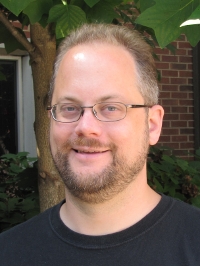Past NIMBioS Postdoctoral Fellow
Nick Matzke
 Dates: September 2013 – July 2015
Dates: September 2013 – July 2015
Personal Website
Twitter: @NickJMatzke
Project Title: Unification of phylogenetic biogeography and species distribution modeling
Nick Matzke (PhD. Integrative Biology, Univ. of California, Berkeley) developed methods to jointly estimate distribution models for a group of related species, linking the large-scale processes studied by historical/phylogenetic biogeography (long-distance dispersal, colonization, speciation, and extinction) with the fine-scale environmental niche models used in species distribution modeling. After completing his fellowship at NIMBioS, Matzke accepted a position as a Discovery Early Career Researcher Award Fellow in the Division of Ecology, Evolution, and Genetics at the Research School of Biology, The Australian National University.
LiveScience Profile Q&A with Dr. Matzke: Reconstructing species migrations across time
![]() NIMBioS Seminar:
Statistical model choice in phylogenetic biogeography: Inference of speciation processes and ancestral range, and prospects for integration with species distribution modeling (SDM)
NIMBioS Seminar:
Statistical model choice in phylogenetic biogeography: Inference of speciation processes and ancestral range, and prospects for integration with species distribution modeling (SDM)
Video Interview:
The origin of species
Feature Story: Research confirms controversial Darwin theory of "jump dispersal"
Publications while at NIMBioS
Perez-Escobar et al. 2017. Recent origin and rapid speciation of Neotropical orchids in the world's richest plant biodiversity hotspot. New Phytologist. 2. 215. 891. [Online]
Zhang GY, Basharat U, Matzke N, Franz NM. 2017. Model selection in statistical historical biogeography of Neotropical insects-The Exophthalmus genus complex (Curculionidae: Entiminae). Molecular Phylogenetics and Evolution, 109: 226. [Online]
Shih PM, Hemp J, Ward LM, Matzke NJ, Fischer WW. 2017. Crown group Oxyphotobacteria postdate the rise of oxygen. Geobiology, 15(1): 19. [Online]
Bapst DW, Wright AM, Matzke NJ, Lloyd GT. 2016. Topology, divergence dates, and macroevolutionary inferences vary between different tip-dating approaches applied to fossil theropods (Dinosauria). Biology Letters, 12(7): 20160237. [Online]
Matzke NJ, Wright A. 2016. Inferring node dates from tip dates in fossil Canidae: the importance of tree priors. Biology Letters, 12(8). [Online]
Dembo M, Matzke NJ, Mooers AO, Collard M. 2015. Bayesian analysis of a morphological supermatrix sheds light on controversial fossil hominin relationships. Proc. R. Soc. B. 282(1812):20150943, The Royal Society. Published 22 July 2015.DOI: 10.1098/rspb.2015.0943. [Online]
Gavin et al. 2014. Climate refugia: joint inference from fossil records, species distribution models and phylogeography. New Phytologist, 204(1): 37-54. [Online]
Matzke NJ. 2014. Model selection in historical biogeography reveals that founder-event speciation is a crucial process in island clades. Systematic Biology, 63(6): 951-970. [Online]
Lawing AM, Matzke NJ. 2014. Conservation paleobiology needs phylogenetic methods. Ecography. [Online]
Matzke NJ. 2014. Model selection in historical biogeography reveals that founder-event speciation is a crucial process in island clades. Systematic Biology. [Online]
Data while at NIMBioS
Bapst DW, Wright AM, Matzke NJ, Lloyd GT. 2016. Data from: Topology, divergence dates, and macroevolutionary inferences vary between different tip-dating approaches applied to fossil theropods (Dinosauria). Dryad Digital Repository. [Online]
Matzke NJ, Wright A. 2016. Data from: Inferring node dates from tip dates in fossil Canidae: the importance of tree priors. Dryad Digital Repository. [Online]
Media Coverage
Human Evolution's Biggest Questions May Find Answers in New Analysis. livescience.com (22 July 2015)
Is Darwin's long debated theory of species migration valid? New research says "yes." The Daily Galaxy (1 October 2014)
Researcher finds support for one of Darwin's controversial theories. iflscience.com (2 October 2014)
Darwin's theories on invasive species and jump dispersal confirmed by experts. International Business Times (2 October 2014)
NIMBioS
1122 Volunteer Blvd., Suite 106
University of Tennessee
Knoxville,
TN 37996-3410
PH: (865) 974-9334
FAX: (865) 974-9461
Contact NIMBioS


